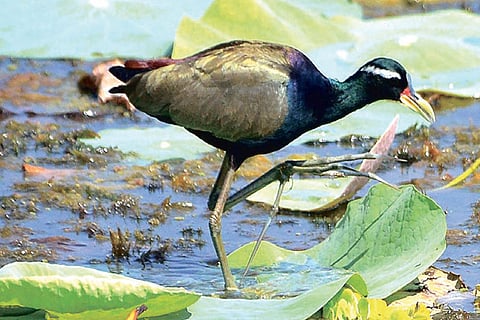

Madurai
The bird has two species, — ‘Bronze-winged Jacana’ and ‘Pheasant-tailed Jacana’, or ‘Lily Trotter’ — which have their habitat in the wetlands trotting on the aquatic plants in the water bodies, according to Davidson Sargunam, International Union for Conservation of Nature (IUCN) member for Ecosystem Management in South Asia.
Citing birds unique characteristics, he said it could be often spotted nesting on trees, but this particular bird species build a floating nest on water and the female mates with five or six males maintaining polyandry.
Another remarkable phenomenon is, usually, the female takes care of the brood and chicks, but in the life of this bird, it is on the contrary that the male has to take care of the eggs and the chicks till they are independent.
“Due to the damage and devastation of the wetlands, encroachments of banks, water pollution, illegal culturing of lotus in ponds, the prevalence of alien invasive species as water hyacinth and other weeds, heavy silting of the ponds and lakes, human disturbance, hunting and poaching of birds, uncontrolled, unscientific fishing activities posed constant threat to these unique birds for survival by habitat loss, threat and attack, Davidson told DT Next on Sunday.
“The lotus collectors tend to damage the nests and eggs acting as stumbling blocks to breeding as the bird moves on the lotus leaves. Consequently, breeding and regeneration of the rare bird is stopped by human activities, which are detrimental to its survival,” he lamented.
About a decade back about 1,000 birds were counted in a survey conducted by Tribal Foundation and Enviro Link, and the bird population has drastically dwindled into hundreds a few years ago and this year’s survey in February volunteers sighted them only in two digits. Citing these issues as a major factor, he feared that this species is heading towards extinction in few years if species-specific conservation is not done for the bird.
Davidson further said that the bird is an environmental heritage of Kanniyakumari and Tamil Nadu as well. Due to the outstanding characteristics of the bird, many people from various parts of India and other countries would visit the ponds to study the bird.
“Such birds are very rare at the global level and it is our bounden commitment to protect them. Loss of the bird will be a great loss to the environmental heritage in India,” he said.
Visit news.dtnext.in to explore our interactive epaper!
Download the DT Next app for more exciting features!
Click here for iOS
Click here for Android